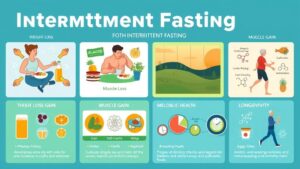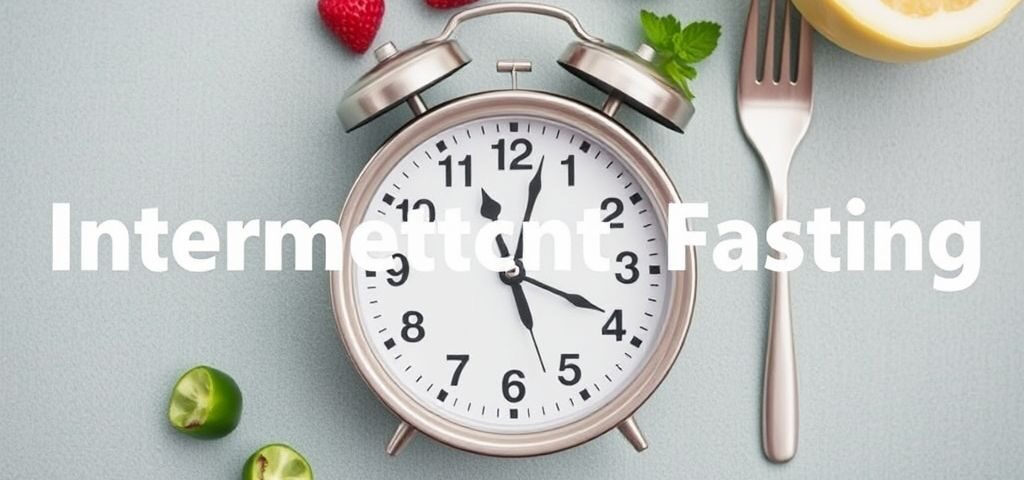In recent years, intermittent fasting (IF) has evolved from a fitness fad into a scientifically backed lifestyle strategy. Unlike typical diets that focus on what to eat, intermittent fasting focuses on when to eat. The idea is simple: cycle between periods of eating and fasting. While this may sound straightforward, it’s more powerful than many realize.
Backed by clinical research, intermittent fasting has been shown to influence weight loss, blood sugar regulation, hormonal health, inflammation, and even longevity. With rising interest in natural, low-effort health solutions, intermittent fasting is one of the most promising wellness practices of 2025.
🔍 Secondary Focus: Types of Intermittent Fasting
There’s no one-size-fits-all approach to intermittent fasting. Here are the most popular and evidence-supported formats:
1. 16:8 Method
This method restricts eating to an 8-hour window and fasting for the remaining 16 hours. It’s ideal for beginners and can be easily paired with a normal sleep cycle.
Example: Eat from 12 pm to 8 pm, then fast from 8 pm to 12 pm the next day.
2. 5:2 Diet
Eat normally for five days of the week, and restrict calories (about 500–600 kcal) on the other two non-consecutive days.
Example: Eat regularly from Monday to Friday and restrict on Tuesday and Thursday.
3. Eat-Stop-Eat (24-hour Fasting)
This involves fasting for a full 24 hours once or twice a week. It’s more advanced and not recommended for beginners.
4. Alternate-Day Fasting
You alternate between eating days and fasting days (either no food or very low-calorie meals on fasting days).
5. OMAD (One Meal a Day)
A more extreme version where all calories are consumed in a one-hour eating window.
Each method has its benefits depending on your goals, health status, and lifestyle preferences.
🧠 Main Body: Benefits of Intermittent Fasting
🧬 1. Weight Loss & Fat Burning
When you fast, insulin levels drop, and the body switches to burning stored fat for energy. Fasting increases norepinephrine and growth hormone, enhancing metabolism. Studies show that intermittent fasting can lead to significant reductions in weight and belly fat without calorie counting.
🩸 2. Improved Insulin Sensitivity
Intermittent fasting improves blood sugar regulation by reducing insulin resistance. It’s particularly helpful for people with pre-diabetes or type 2 diabetes. Several 2024 clinical trials demonstrated a 10–20% reduction in fasting insulin levels with IF.
🧠 3. Cognitive & Brain Health
Fasting stimulates brain-derived neurotrophic factor (BDNF), a protein linked to brain health, memory, and mood. It may also reduce the risk of neurodegenerative diseases like Alzheimer’s and Parkinson’s.
❤️ 4. Cardiovascular Health
Studies show that intermittent fasting reduces blood pressure, LDL cholesterol, triglycerides, and inflammation markers — all major risk factors for heart disease.
♻️ 5. Autophagy and Longevity
Fasting activates autophagy, the body’s process of cleaning out damaged cells. This anti-aging mechanism may protect against cancer, neurodegeneration, and age-related diseases.
🍴 Intermittent Fasting Meal Plan (16:8 Method Example)
Here’s a sample plan for someone eating between 12:00 PM and 8:00 PM:
| Time | Meal | Example |
| 12:00 PM | Lunch (Breakfast) | Grilled chicken salad with olive oil, quinoa, and avocado |
| 3:00 PM | Snack | Greek yogurt with berries and almonds |
| 7:30 PM | Dinner | Baked salmon, steamed broccoli, and sweet potato |
| 8:00 PM – 12:00 PM (next day) | Fasting Period | Water, black coffee, and herbal teas only |
⚖️ Intermittent Fasting for Different Goals
🔥 Weight Loss
Intermittent fasting creates a calorie deficit without tracking macros. Combined with exercise, it enhances fat oxidation and muscle preservation.
💪 Muscle Gain
Although muscle gain can be more challenging, strategic nutrient timing and high-protein meals within your eating window can support lean muscle growth.
🌺 Women’s Health
Women may need modified fasting plans. The 14:10 method is often recommended (14 hours fasting, 10 hours eating). Fasting should be stopped if it causes menstrual irregularity, fatigue, or mood swings.
🧓 Seniors and Longevity
Older adults interested in fasting for longevity benefits should consult a doctor, especially if they take medications. Modified fasting can enhance mitochondrial health and reduce inflammation.

⚠️ Potential Side Effects and How to Avoid Them
| Side Effect | Description | Solution |
| Hunger | Most common in the first week | Stay hydrated; increase fiber and fat intake |
| Fatigue or Brain Fog | May occur during adaptation | Adjust the fasting window gradually |
| Headaches | Often due to dehydration | Drink electrolytes or herbal teas |
| Overeating during the eating window | Can stall progress | Plan balanced meals ahead of time |
| Hormonal imbalances (women) | May affect the menstrual cycle | Try shorter fasts or fast less frequently |
💡 Tips for Successful Intermittent Fasting
Start slow – Begin with 12:12 or 14:10 and increase as your body adjusts.
Stay hydrated – Water, green tea, and black coffee help curb hunger.
Avoid binging – Use whole foods, not processed junk, during your eating window.
Use apps – Apps like Zero or FastHabit track progress and provide support.
Get quality sleep – Poor sleep can increase hunger hormones.
🧘 Intermittent Fasting & Lifestyle: How to Make It Sustainable
Pair IF with a whole-foods diet (e.g., Mediterranean or low-carb).
Adjust your eating window to fit your schedule, not vice versa.
Stay flexible. Don’t fast on days with heavy workouts or emotional stress.
Treat it as a lifestyle, not a crash diet.

🧾 Final Thoughts: Is Intermittent Fasting Right for You?
Intermittent fasting isn’t a magic bullet, but it’s a highly effective and research-backed strategy to improve metabolic health, support weight loss, and enhance longevity. Whether you’re a busy professional, a fitness enthusiast, or someone simply seeking better health, intermittent fasting in 2025 offers a simple, sustainable, and customizable lifestyle shift.
🙋♀️ Frequently Asked Questions (FAQs)
❓1. Is intermittent fasting safe for everyone?
Not always. Pregnant or breastfeeding women, people with eating disorders, or those on medications should consult a doctor first.
❓2. Can I drink coffee or tea while fasting?
Yes! Black coffee, green tea, and herbal teas without sweeteners are allowed.
❓3. Will fasting slow down my metabolism?
No. Short-term fasting (up to 48 hours) may increase metabolism. Prolonged fasting can reduce it if not managed correctly.
❓4. How long does it take to see results?
Many people notice changes in 2–4 weeks, especially with improved energy, better sleep, and fat loss.
❓5. Does intermittent fasting cause muscle loss?
Not significantly, especially if you’re eating enough protein and doing resistance training.

